
Dr Mahaletchumy works for Mabic, which promotes biotech in Malaysia by providing government agencies, research institutes, universities, farmers, trade groups, industry leaders and the media with accurate and evidence-based resources (Photo: Kenny Yap/The Edge)
There is a disconnect between what goes on in biotechnology laboratories and what people construe. To bridge this gap, scientists have to step out and engage with the public, using words the layman can understand.
Science communication requires a vocabulary that speaks directly to and resonates with whoever you are addressing. Apart from students and the ordinary person, your target audience could be stakeholders who can make science more accessible and popular, decide policy based on empirical data, monitor procedures or draw up regulations for their application, says Dr Mahaletchumy Arujanan, executive director of the Malaysian Biotechnology Information Centre (Mabic).
Maha — “Call me that”, she says — sees science in everything and is zealous about convincing anyone who will listen that it is not an isolated subject or only for the elite. “It is not easy, but not impossible to communicate science. It’s for everyone and affects everything we do,” she says.
What complicates the subject are the futuristic aspects that make people baulk at untoward scenarios, adds the science communicator, referring to the Chinese biophysicist who claimed he altered the genetic make-up of a pair of twins and was jailed last December.
“A lot of the time, scientists are perceived to be playing with nature because we are tweaking crops, coming up with vaccines and antiviral things and editing genes,” Maha explains. These trigger safety concerns and, as a result, potential biotechnology tools are not approved.
Misinformation, bad press and fear of the unknown affect how we view science, Maha adds. All the more reason to boost literacy so those in lab coats can better explain what they are doing, how and why. This will give people the facts about, say, genetically modified (GM) foods, bamboo tableware, and bats and the novel coronavirus, so they have a clearer picture of the disciplines related to biotech and what each involves.
The “why” factor can make the difference between a cursory interest in a breakthrough and access to credible information for those who will benefit from it, says Maha. She holds a master’s degree in biotech but realised that examining and analysing molecules and cells was not for her. Instead, she chose to collate news on science to create awareness. Thus her PhD was in science communication.
A student may like science but not wish to study biology. “I don’t think that’s wrong. We need interested and curious marketeers, salespeople, fund managers, accountants, teachers and journalists to help people comprehend what’s going on and raise interest in the subject.”
Mabic promotes biotech in Malaysia by providing government agencies, research institutes, universities, farmers, trade groups, industry leaders and the media with accurate and evidence-based resources. Guided by that, they can make informed decisions on foods and nutrition, healthcare, environment management and lifestyle choices.
---
For the full story, pick up a copy of The Edge Malaysia (June 29, 2020) at your nearest news stand. Save by subscribing to us for your print and/or digital copy.


